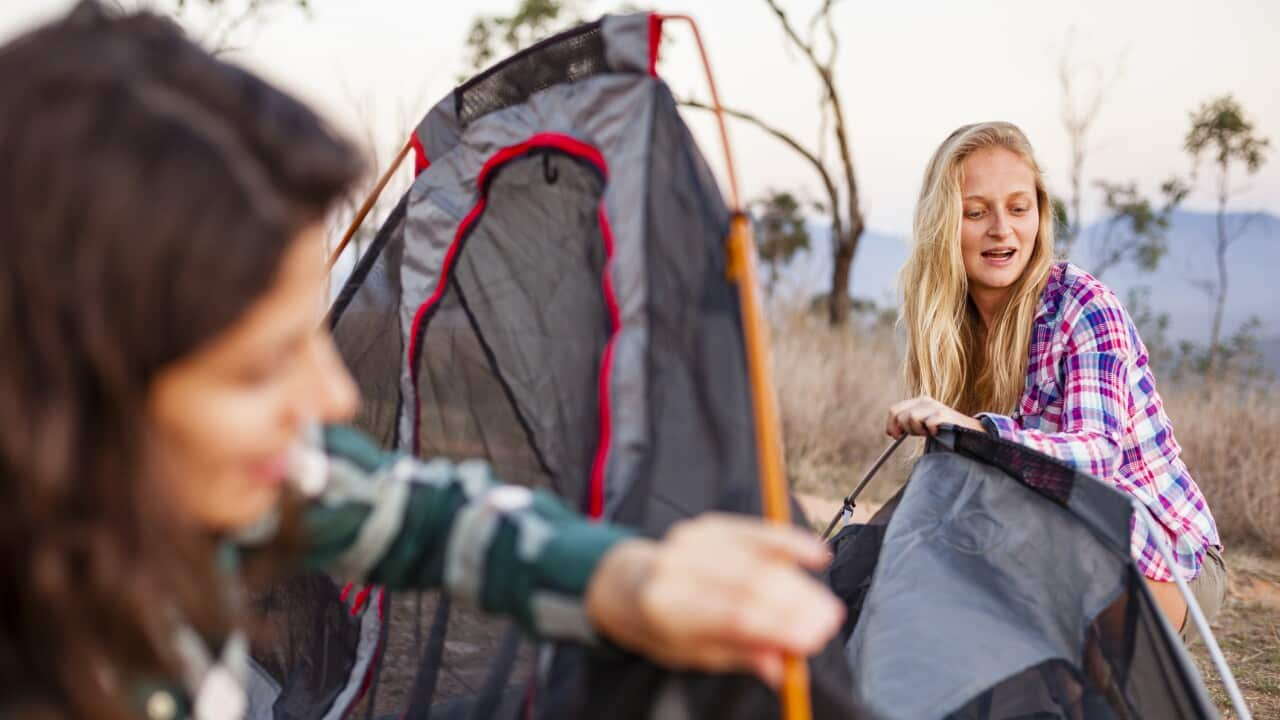Αυτό το επεισόδιο είναι κατάλληλο για μαθητές μεσαίου επιπέδου. Μετά την ακρόαση, ελέγξτε τις γνώσεις σας με το κουίζ μας παρακάτω.
Σημειώσεις εκμάθησης
Διαφορετικές φράσεις για το στήσιμο μιας σκηνής:
- Let’s pitch this tent. - Ας στήσουμε αυτή τη σκηνή.
- Grab the pegs. - Πιάσε τα πασαλάκια.
- Put up the tarp. - Βάλε τον μουσαμά.
- Set up the tent poles. - Τοποθετήστε τους στύλους της σκηνής.
- Stake down the corners. - Καρφώστε τις γωνίες.
- Make sure it’s level. - Βεβαιωθείτε ότι είναι επίπεδο.
Εκφράσεις της καθομιλουμένης:
Εvery now and then είναι μια ανεπίσημη φράση που σημαίνει μερικές φορές ή περιστασιακά.
Όλα τα πράγματα που σκαρώνουν ο Allan και η Claire είναι ένας ανεπίσημος και ελαφρώς χιουμοριστικός τρόπος για να πούμε όλα τα πράγματα που κάνουν, επειδή το να σκαρώνεις κάτι - get up to something είναι να κάνεις κάτι άτακτο που δεν θα έπρεπε να κάνεις.
Λεξιλόγιο:
Stunning σημαίνει πολύ όμορφο.
To stun someone σημαίνει να τον χτυπάς στο κεφάλι ώστε να αισθάνεται ζαλισμένος και να μην μπορεί να σκεφτεί κανονικά.
Κατασκήνωση-Camping είναι η διαμονή ή η διαμονή σε σκηνή. Οι άνθρωποι που απολαμβάνουν την ύπαιθρο μπορούν να κάνουν διακοπές σε κάμπινγκ.
Ένας χώρος κατασκήνωσης-campground ή κάμπινγκ-camping είναι ένα μέρος όπου οι άνθρωποι πηγαίνουν για κάμπινγκ.
To pitch a tent σημαίνει να στήσεις μια σκηνή.
To pitch something σημαίνει να βάζετε ή να πετάτε κάτι, όπως για παράδειγμα να ρίχνετε μια μπάλα.
To pitch an idea σημαίνει να ρίχνεις μια ιδέα και να προσπαθείς να πείσεις κάποιον ότι είναι καλή.
Gear είναι ένας ανεπίσημος τρόπος να λέμε "πράγματα", συχνά πράγματα που χρησιμοποιούνται για ένα χόμπι ή ένα άθλημα.
Pegs, or stakes είναι οι μεταλλικοί πείροι που σπρώχνετε στο έδαφος για να κρατήσετε μια σκηνή στη θέση της.
To grab something σημαίνει να τραβήξετε κάτι προς το μέρος σας γρήγορα, αλλά χρησιμοποιείται ανεπίσημα στα αυστραλιανά αγγλικά απλά για να σημαίνει να πάρετε κάτι ή να σας δώσετε κάτι. Το ακούτε συνέχεια. Για παράδειγμα, οι άνθρωποι συχνά λένε "let's grab something to eat".
To stake down the corners σημαίνει να βάζετε έναν πάσσαλο σε κάθε γωνία για να κρατάτε μια σκηνή ασφαλή.
To tilt σημαίνει πέφτω προς τη μία πλευρά, δεν είμαι επίπεδος.
Tarp είναι ένα μεγάλο αδιάβροχος μουσαμάς, συνήθως από πλαστικό, το οποίο μπορείτε να χρησιμοποιήσετε για να καλύψετε κάτι που δεν θέλετε να βραχεί.
Level-headed σημαίνει ήρεμος και ελεγχόμενος.
Mozzy είναι μια ανεπίσημη λέξη για το κουνούπι.
Mozzy spray είναι ένα προσωπικό σπρέι για την προστασία των ανθρώπων από τα κουνούπια.
To whack something on είναι ένας ανεπίσημος τρόπος για να πεις ότι βάζεις κάτι γρήγορα.
Learning focus:
Συχνά θέλουμε να είμαστε ευγενικοί με φιλικό και όχι με επίσημο τρόπο. Μπορούμε να το κάνουμε αυτό στα αγγλικά με το να δείχνουμε ότι ρωτάμε αν κάποιος μπορεί να κάνει κάτι αντί να του λέμε να το κάνει.
Ένας άλλος τρόπος είναι να χρησιμοποιείτε ανεπίσημες λέξεις αντί για επίσημες λέξεις. Για παράδειγμα, ο Josipa δίνει το παράδειγμα ότι ο Allan θα μπορούσε να πει στην Claire "μπορείς να φέρεις τη σάλτσα ντομάτας ". Χρησιμοποιεί τη φράση " μπορείς " ώστε το αίτημά του να μοιάζει με ερώτηση, αλλά δεν θέλει να μάθει αν η Κλερ μπορεί να του φέρει τη σάλτσα ντομάτας, θέλει να το κάνει στην πραγματικότητα!
Επιλέγει επίσης να χρησιμοποιήσει την άτυπη λέξη ‘grab’ αντί της πιο επίσημης λέξης ‘get’ ή ‘pass’. Αυτό συμβάλλει στο να γίνει το αίτημά του όχι μόνο ευγενικό, αλλά και φιλικό.
Ακολουθούν μερικά άλλα παραδείγματα που μπορεί να ακούσετε να λένε:
- Can you grab his name (= please take down his name)
- Can you grab me a sandwich (= please buy me a sandwich)
- Can you grab the phone (= please answer the phone)
Listen out for other examples.
Practise the phrases learned in this episode

Bonus Practice: #77 Setting up a tent (Med)
SBS English
07/01/202503:06
Transcript:
(Note: This is not a word-for-word transcript)
SBS acknowledges the Traditional Custodians of Country and their connections and continuous care for the skies, lands, and waterways throughout Australia.
Ahh…fresh air. Hello, I’m Josipa and every now and then I like to take a break from the city and enjoy nature. When I first arrived in Australia, I fell in love with the long, sandy beaches. But the beaches near the city can get really crowded. And I don’t like that.
So sometimes I drive a bit further out from the city to find stunning, quiet beaches where I can enjoy nature for days.
Stunning, by the way, means really very beautiful - so beautiful that you are stunned or so impressed you can’t move. There are often campgrounds or campsites near these beaches where you can stay.
A campground or campsite is a place where people go camping, that is, stay there in a tent. It’s the type of holiday I really like because I can enjoy the outdoors without having to go home or stay in a hotel.
Many campgrounds have facilities like toilets, outdoor showers, BBQ areas and spaces to pitch your tent.
To pitch your tent means to put up a tent, but we can also use the word pitch if we want to throw out or share an idea with somebody for them to think about. In that case, you might say, ‘I’d like to pitch an idea.’ It means you want to present your idea for them to consider.
Or if you want to help out, you can say that you would like to ‘pitch in’. Let’s all pitch in and work together. ‘Pitch in’ means to contribute or help with something, especially when working as part of a group.
Here, the word pitch means to set something up, in this case, a tent. In this episode we are focusing on phrases related to setting up a tent.
Allan and Claire love camping. They’ve pitched their tents all over Australia. And to be completely honest, sometimes I get jealous about all the things Allan and Claire get up to, that means, all the exciting things that they do.
Right now, they’re pitching a tent probably somewhere absolutely stunning. Let’s hear how they talk about what they are doing.
Allan
Alright, let’s get all our gear out and pitch this tent before it gets dark.
Claire
Good idea. Do you want me to grab the pegs?
Allan
Yes, please. I’ll put up the tarp.
Claire
And I can set up the tent poles.
Allan
First, let me stake down the corners.
Claire
The tent’s looking good. Let’s make sure it’s level, though.
Allan
Perfect. All set! Time to whack on some mozzy spray and enjoy the campfire.
There’s a lot of new words to learn when we want to talk about camping, so let’s get into it.
Allan first said,
Let’s get all our gear out and pitch this tent before it gets dark.
So, Allan wants to take the gear out of the car and pitch the tent before it gets dark.
When we say 'gear,' we mean all the things you need for camping. Besides a tent, what other gear do you think you should bring camping? I can think of a few things— food, water and an esky (a cooler to keep my food and drinks cold) And a camping chair would be good too, so that I can sit and enjoy a cold drink.
Claire then said,
Do you want me to grab the pegs?
Pegs, or stakes as they are often called, are metal pins that you push into the ground to keep the tent in place. Let’s hear Claire’s question once again.
Do you want me to grab the pegs?
So, Claire is asking if she should grab the pegs, which is another way of saying ‘get the pegs.’
We say ‘grab’ when we want to have or get something. For example, when Allan and Claire are cooking sausages for their camp dinner later, one of them might say ‘can you grab the tomato sauce’ which is a friendly way of saying ‘please get the tomato sauce.’
Allan replied,
I’ll put up the tarp.
A tarp is a big waterproof sheet, usually made of plastic, that you can use to cover things that you don’t want to get wet. In this case, the tarp will cover the tent to protect it if it rains. You tie ropes to the corners and attach them to something like a tree or pole.
So, when Allan says he wants to ‘put up a tarp’, he means he wants to set it up, over the tent, for cover in case it rains.
Back to the conversation,
Claire:
And I can set up the tent poles.
Allan:
First, let me stake down the corners.
This is classic tent talk! Tent poles are the sticks that make the frame for the tent. You usually have to put them together to make the frame.
And to stake down the corners means to push the stakes, the metal pins, into the ground to keep a tent in place.
The tent’s looking good. Let’s make sure it’s level, though.
Claire wants to make sure the ground they’re choosing to pitch the tent on is flat, or level, so the tent doesn’t tilt, that is, doesn’t fall to one side.
Allan and Claire seem really level-headed while as they are setting up their tent. I know when I try, I can get very frustrated and not level-headed at all!
To be level-headed means to stay calm and in control. Are you a level-headed person or do you easily get frustrated?
At the end of our dialogue, Allan said,
Time to whack on some mozzy spray and enjoy the campfire.
Mozzy is an informal word for mosquito, and mozzy spray is mosquito repellent, that is, the spray that you put on to keep mosquitoes away from you.
Allan didn’t just say ‘put on mozzy spray’; he said, ‘whack on mozzy spray!’ When you want to put something on quickly, you can say ‘whack it on.’ For example, if you’re late for work, you’d whack your clothes on fast!
Big thanks to our guest Magda Dejneka. Paul Nicholson and Lily O'Sullivan voiced the characters of Allan and Claire and Professor Lynda Yates was our educational consultant.









